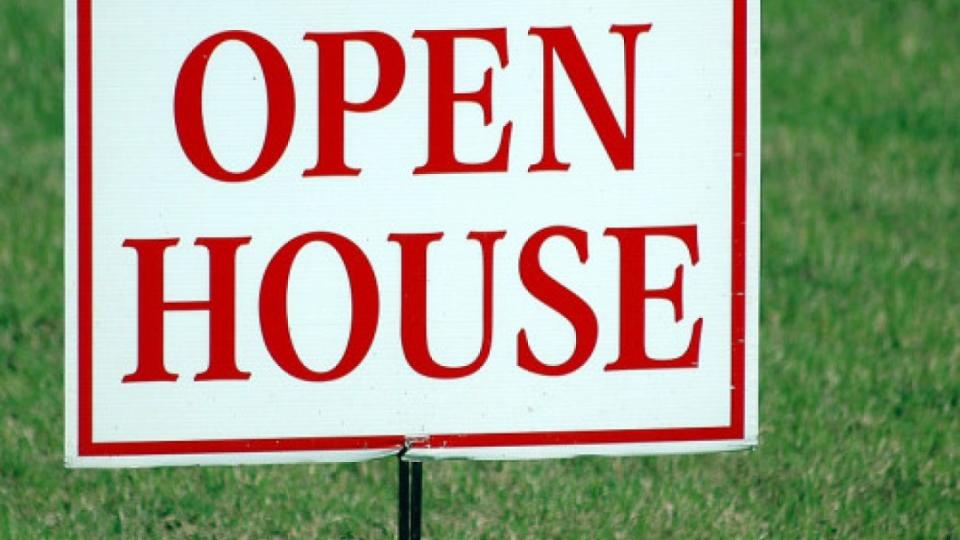Sometimes when searching for the perfect home to purchase you just fall in love with a property. It may have a great layout, a beautiful kitchen, luxurious bathrooms, and other features that get you excited to buy. But once you have a home under contract, it pays to hire a home inspector before you buy. Never forgo the inspection just because you love a property, or you could be left with a real mess on your hands.
When newlyweds Adam and Meredith found a home they loved, they were tempted to rush into a purchase. But Adam’s dad Dale Caldwell knew better and suggested that they have the home inspected first.
What they found could have cost them dearly!
The home inspection started out pretty simply. The roof, attic, and other home features seemed to be in good shape. But when they got to the basement, they noticed a big problem. In the retaining wall that formed the foundation of the house, a large crack stretched nearly all the way across the house. The repair work was more than the newlyweds wanted to take on, so they walked away from the house.
But the home inspector wasn’t so lucky. He didn’t walk away, he was chased away. The homeowner quickly learned about what he had found and ordered him to immediately leave her property or she would call the police. Later, she left a nasty review for him online. Of course, he had no choice but to respond to the review, since his reputation is how he keeps his business going.
If Adam and Meredith hadn’t gotten the inspection, they would have bought the house and only found out about the crack in the foundation afterward. They would be left with a large, expensive repair that they never bargained for.
What Home Inspectors Look For
When a home buyer gets a whole-home inspection, the inspector will look over the house for any damage that the home buyer would have to repair after the purchase. Once the inspection is done, the buyer can negotiate with the seller to do some of the repairs or reduce the price of the home. Of course, it’s still up to the home buyer whether they want to buy the home in its current condition. But the home inspection allows the homebuyer to make the purchase with full knowledge of what they are getting.
Water Drainage and Disbursement
The biggest issue any home inspector looks for is water. This starts outside the home. The area around a home should be properly graded so that when it rains or there is other water, the water flows away from the home, not towards it. If water is flowing towards the home there could be damage to the foundation, which is often expensive to repair.
You will also want to look throughout the house for any signs of moisture. That could include a damp or musty smell in an attic, crawl space, or basement. Of course, if there are visual signs of mold, that has to be dealt with before you move into the home.
Foundation
Foundations are not cheap to repair, so it pays to make sure the foundations of your future home is in good shape. There are also codes that govern foundations, so if your foundation isn’t up to code you may have to bring it up to code.
Roof
All roofs age. A common asphalt roof has a lifespan of 15 to 18 years. As an asphalt roof ages, the shingles tend to cup either up or down. No one can expect a brand new roof when they buy a home (unless it is a new build). But it pays to be aware of how soon you will have to replace the roof and whether there is any acute damage that could lead to leaks or other issues.
Insulation
Check the attic and other areas of the home for proper insulation. Inadequate insulation can lead to higher heating and cooling bills.
Plumbing
Moisture is the enemy of a home. If there are plumbing issues, you could be looking forward to inevitable water damage. Depending on the age of the home, there may be a number of issues with the plumbing. These issues can be due to aging or due to the types of materials and installation that were used at the time the home was built.
HVAC System
Just like inadequate insulation, a failing HVAC system could lead to higher heating and cooling costs. An older HVAC system, like an older roof, should not be a deal breaker, but it’s good to know what you are walking into. Of course, major problems with the HVAC system may need to be addressed prior to closing.
Electrical System
The construction codes regarding electrical systems have gone through a lot of changes over the last decades. Especially if you are buying an older home, it pays to make sure that the electrical system can handle modern loads. Also, if any work was done on the home you want to be sure that electrical work was done to code. Aging or poorly installed electrical systems can pose a fire risk, so it is important to repair problems if they are discovered.
Other Issues
Other areas to look for are the structural integrity of the chimney and flooring. It is also important to look for signs of environmental issues, such as asbestos, lead paint, or leaking gas. It is also worth noting the general upkeep and maintenance of the house. If it looks like the house has been poorly maintained, there may be issues that come up. Ultimately, the maintenance will have to be done, and if it wasn’t done by the previous owner, you’ll end up doing it yourself.

